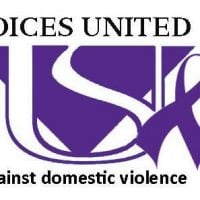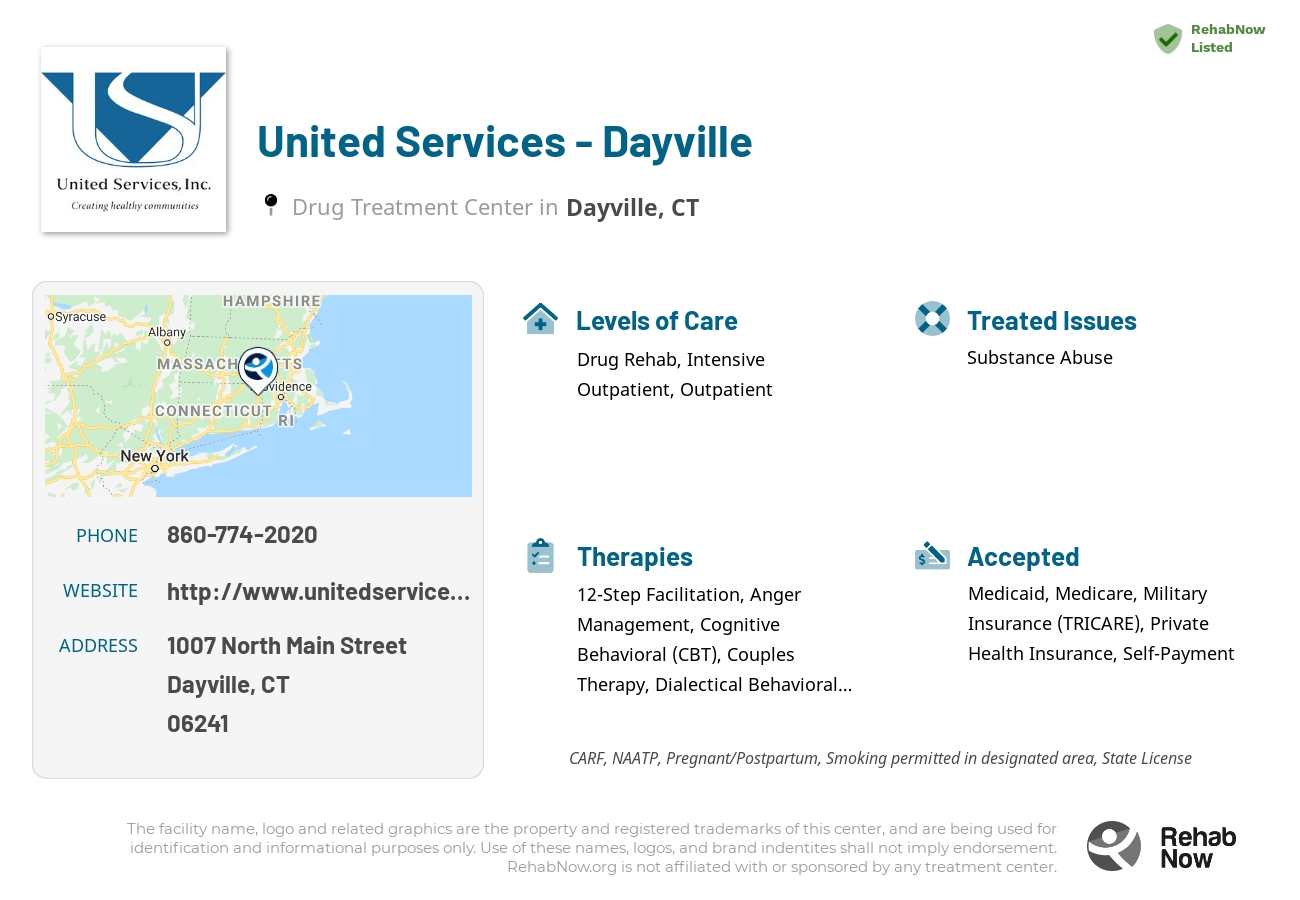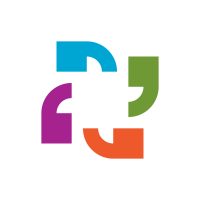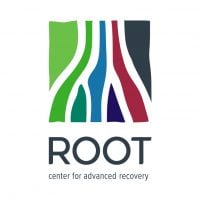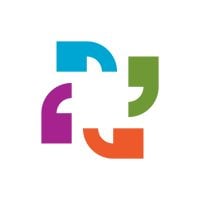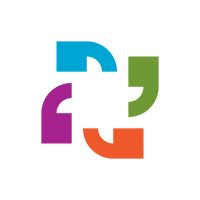United Services - Dayville
Drug Rehab Center in Dayville, Connecticut
United Services - Dayville in Connecticut provides evidence-based addiction and behavioral health treatment services, including individualized treatment plans and specialized therapies, to help individuals identify and address underlying causes and develop healthy coping skills and positive lifestyle changes.
About United Services - Dayville in Connecticut
United Services - Dayville is an addiction treatment facility located in Dayville, Connecticut. The facility offers personalized treatment for people struggling with substance abuse and addiction-related problems such as Alcoholism, Dual Diagnosis, Opioid Addiction, Drug Addiction, Mental Health, and Substance Abuse. Their services include Drug Rehab, Dual-Diagnosis, Intensive Outpatient, Outpatient, and Detox levels of care, and they accept Private Health Insurance. United Services - Dayville is licensed and accredited by the state of Connecticut and is affiliated with United Services.
At United Services - Dayville, each individual receives personalized treatment plans tailored to their needs. Their services cover an array of mental health and substance abuse issues, and are tailored to help individuals recover from all stages of addiction. The facility provides a variety of therapies that help individuals manage cravings, understand the underlying reasons for their addictions, and manage the stress, anger, and anxiety that often come along with it. United Services - Dayville also offers educational resources, group and individual counseling, and case management services, as well as aftercare and relapse prevention plans.
Genders
Ages
Modality
Additional
Conditions and Issues Treated
With so many people addicted to opioids, we need to help those who want to quit. The cycle begins when opioid addicts take opioids for a painful injury. When someone starts taking their medication differently or in excess, it means they’re addicted and at risk of overdosing.
In , detoxing from these types of treatments is the most effective way to beat this. Most facilities begin with medical assistance and then provide counseling services; rehabilitation follows after successful treatment.
Dual diagnosis refers to someone who has both an addiction and a mental or emotional illness. Dual diagnosis treatment includes therapy for both issues simultaneously, allowing for effective treatment of either.
Sometimes people with addiction disorders also have co-occurring disorders like depression, anxiety, bipolar disorder, etc. These require specialized treatment programs that address both drug and alcohol addiction as well as psychiatric illnesses. Some rehabilitation facilities provide patients with co-occurring disorders a program with highly integrated services and a clean, distraction-free environment.
Levels of Care Offered
This center offers a variety of custom treatment tailored to individual recovery. Currently available are Drug Rehab, Dual-Diagnosis, Intensive Outpatient, Outpatient, with additional therapies available as listed below.
An intensive outpatient program (IOP) is effective for drug rehab, but it can take six months to several years to complete. It’s the most popular type of drug rehab program in the United States. One example of a successful IOP success story is actor and comedian Chris Rock, sober since 1990.
An IOP allows participants to spend nights at home while attending meetings throughout the day. It’s a good way for drug addicts to make a recovery plan in an outpatient setting while still supporting their loved ones.
Alcohol or drug addiction, or co-occurring disorders, are treated in an outpatient program. The patient must attend therapy and other programs at the facility but can return home each night.
Outpatient treatment allows recovering addicts to live at home while receiving addiction treatment. Outpatients can attend group sessions for a few hours per week. Outpatients may also continue to work full time and study/attend school without interruption if they choose.
Therapies & Programs
Different people react differently to various treatment options. Some drug rehabilitation centers offer individualized treatment that caters to the specific needs of a drug addict. The best treatment option varies on an individual depending on the type of drug abused, life history, medical condition of the person, social circumstances, and the environment they live in now.
When a person enters drug rehab, they usually have anti-drug associations such as withdrawal symptoms, stress, cravings, etc. The first step of drug rehab is to detoxify the body from any residual substances in it. Drug rehabilitation centers usually employ trained medical professionals to help in this process. Usually, the initial detoxification lasts for five days, where the person is monitored under close supervision.
Family therapy sessions typically involve the addict and their family members. During these sessions, a therapist will work with everyone involved to help them understand addiction and find healthy ways of coping without substance abuse.
Some addicts might feel embarrassed about their substance abuse problems. By encouraging family members to attend these sessions, therapists can show addicts that they’re not alone in dealing with addiction. Therapists can also work with family members to help them understand addiction and learn how to offer support and encouragement to their loved one as they deal with substance abuse issues.
Attending group therapy at United Services - Dayville in , is a useful way for those seeking sobriety to realize they aren’t the only one going through it.
This is when a group of people on different recovery phases get together and talk about what they’re going through, their triggers, successes, and failures. This can include alternative types of therapies too! Group therapy may occur on an outpatient or inpatient basis with groups that have no pre-existing relationships outside the session, unlike support groups where everyone already knows each other beforehand.
Trauma therapy is a form of therapy used to help people process and understand past traumas. This can help struggling addicts, as many people turn to drugs or alcohol to mask the pain of their past. Trauma therapy can be done in several ways, such as through visualization, discussion, and writing down thoughts and feelings. The goal is to help the individual understand why they are having problems coping with certain situations and changing how they think and react to things. This is often done in tandem with other therapies to treat the underlying issues associated with addiction.
The idea behind trauma therapy is that while some people can experience traumatic events and not have lasting psychiatric symptoms, many others will. In these cases, memories get hidden from consciousness but continue to influence how the person processes and copes with things in their life. They may avoid situations that resemble what happened or become suddenly angry or irritated to a situation that reminds them of a past event. With the help of a therapist, people can go back over memories and experiences. This helps them understand why they are having problems coping with certain situations and changing how they think and react to things.
This type of cognitive-behavioral therapy helps people understand how their thoughts, behaviors, and feelings are interconnected. It can help patients with borderline personality disorder gain control over their actions and stop self-harming thoughts and attempts.
Cognitive Behavioral Therapy is a type of psychotherapy that helps people address the thoughts and behaviors that may have led to their addiction. It also helps change negative thoughts into positive ones and promotes healthy communication between addicts and those around them. CBT is an efficient treatment for individuals suffering from all sorts of addictions.
Cognitive Behavioral Therapy (CBT) focuses on the underlying thoughts and behaviors that caused the problem of addiction in the first place and may cause a relapse. Negative feelings are common in drug abuse disorders, but they can lead to co-occurring disorders if not recognized. CBT involves strategies that help to change the behavior pattern by restructuring negative thoughts into positive ones. It helps to remove these feelings, and it provides long-term benefits. Also, CBT promotes self-awareness, self-control and can be administered as a mono-therapy or as part of combination therapy.
Payment Options Accepted
For specific insurance or payment methods please contact us.
Is your insurance accepted?
Ask an expert, call (888) 674-0062
United Services Associated Centers
Discover treatment facilities under the same provider.
- United Services - Mansfield in Willimantic, CT
- United Services - Dayville in Dayville, CT
- United Services - Willimantic in Willimantic, CT
Learn More About United Services Centers
Additional Details
Specifics, location, and helpful extra information.
Dayville, Connecticut 6241 Phone Number(860) 774-2020 Meta DetailsUpdated November 25, 2023
Staff Verified
United Services - Dayville Patient Reviews
There are no reviews yet. Be the first one to write one.
Dayville, Connecticut Addiction Information
Connecticut has a higher rate of substance abuse and addiction than the national average. The state ranks in the top 10 in the country for illicit drug dependence among those ages 18 to 25. In 2010, there were 9,211 people admitted to an alcohol treatment facility for alcohol abuse combined with a secondary drug. Connecticut ranked fifth in the United States of America for the number of fatalities involving drunk driving in 2014.
Over 1,000 people in Dayville are addicted to drugs. The city has seen a sharp increase in overdoses in recent years. Opioids were responsible for more than half of all drug overdoses in the city in 2016. This has a major impact on the community, as it increases crime rates and puts a strain on resources. The best treatment facilities in Dayville provide a person with all the resources to stay sober.
Treatment in Nearby Cities
- Litchfield, CT (67.8 mi.)
- Windsor, CT (39.4 mi.)
- Bridgeport, CT (81.6 mi.)
- Milford, CT (74.2 mi.)
- Chester, CT (43.2 mi.)
Centers near United Services - Dayville
The facility name, logo and brand are the property and registered trademarks of United Services - Dayville, and are being used for identification and informational purposes only. Use of these names, logos and brands shall not imply endorsement. RehabNow.org is not affiliated with or sponsored by United Services - Dayville.
